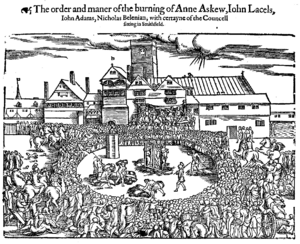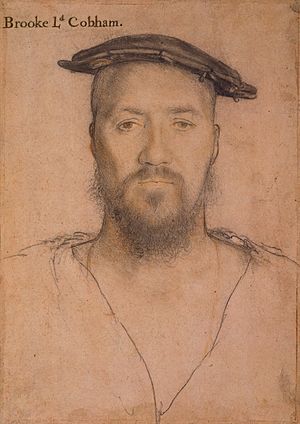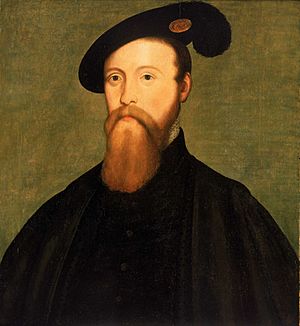George Blagge facts for kids
Sir George Blagge (born around 1512 – died 17 June 1551) was an important person in England during the time of King Henry VIII and his son, King Edward VI. He was a courtier (someone who served at court), a politician, a soldier, and even a minor poet. He served as a Member of Parliament (MP) for Bedford from 1545 to 1547, and then for Westminster from 1547 until his death in 1551.
In 1546, he was put on trial and found guilty of heresy (having religious beliefs that went against the official church teachings). This event made him famous among Protestants who remembered people who suffered for their faith. His family name was often spelled Blage or Blake by people at the time.
Contents
Early Life and Learning
George Blagge was the oldest son of Robert Blagge and Mary Brooke.
- Robert Blagge was an important judge in a court called the Exchequer of Pleas. He became wealthy under the Tudor kings and owned land in many parts of England, including Somerset, Bristol, Holloway, Westminster, and Kent.
- Mary Brooke was the daughter of John Brooke, the 7th Baron Cobham, who was a major landowner near Blagge's family lands in Kent. George was born around 1512.
George's father, Robert, passed away around 1522. He was buried near his first wife in a family chapel at St Bartholomew-the-Great church. Robert left George the use of his lands in the southwest of England and at Holloway, as well as two houses in Dartford. George later moved to Westminster, as he was described as "of Westminster" after he was pardoned in 1546. Even before he became very wealthy, people noted that Blagge was a "gentleman, a man of fair lands."
George Blagge received his education at Cambridge University.
Starting His Career
Finding a Sponsor
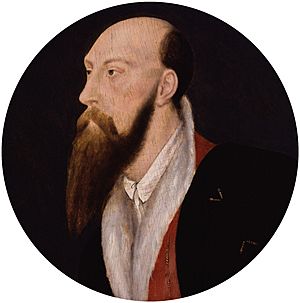
Like many young gentlemen from less powerful families, Blagge spent his early career looking for a powerful person, called a patron or sponsor, who could help him get ahead. However, he wasn't always lucky with his choices, as his most important sponsors faced serious political problems.
First, he became connected with Sir Thomas Wyatt, a rising landowner from Kent who was married to one of Blagge's cousins. Wyatt was a few years older than Blagge and was supported by Thomas Cromwell, King Henry VIII's chief minister. Wyatt was a poet and a diplomat, and he greatly influenced Blagge, who tried to write poetry like him. Blagge likely traveled with Wyatt to France and Germany in 1535–36.
In 1536, Wyatt narrowly avoided execution when he was rumored to have been involved with Anne Boleyn, the Queen. But Cromwell protected him, and Wyatt became King Henry's ambassador to Charles V, Holy Roman Emperor, in 1537. Blagge went with him to France and Spain and carried important messages for him in 1539. Blagge showed his loyalty by speaking up for Wyatt when he was accused of diplomatic mistakes in 1541. Wyatt died the next year.
Blagge then became connected to Henry Howard, Earl of Surrey, a friend of Wyatt and a famous poet. Surrey was the son of Thomas Howard, 3rd Duke of Norfolk, one of the most powerful nobles in England. Blagge was a few years older than Surrey and wasn't afraid to tell him off for his wild behavior. This was noted when the King's council investigated Surrey's rioting in London in 1543.
In July 1543, English forces were sent to help fight in the Low Countries. Blagge went with Surrey, leading 12 soldiers from Kent. Blagge and Sir George Carew were almost killed by enemy fire while inspecting a trench during a siege. Both Surrey and Blagge were praised for their bravery in the fighting. Blagge was known by his friends as "Tom Trubbe." His military service likely helped him when he was given the job of steward of Maidstone manor in March 1544. This job had previously belonged to his friend, Thomas Wyatt.
Before 1547, probably with Surrey's help, Blagge became an esquire of the body, a close servant to King Henry VIII, who used to call him 'Pig'. This position gave Blagge great influence right at the heart of the royal household.
MP for Bedford
Blagge's growing importance was clear when he was elected to Parliament to represent the town of Bedford in early 1545. Sir Francis Bryan, who knew Blagge well from their time serving with Wyatt, was very influential in Bedford. Bryan was a skilled political organizer and a close friend of the King. He likely helped arrange Blagge's election. When Blagge was arrested in 1546, he was an elected MP. However, because Parliament was not meeting at the time, he was not protected by parliamentary privilege (a rule that protects MPs from arrest for certain things while Parliament is in session).
Trial for Heresy
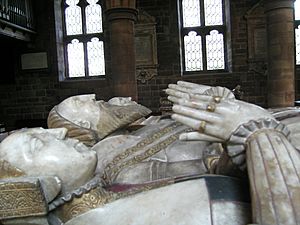
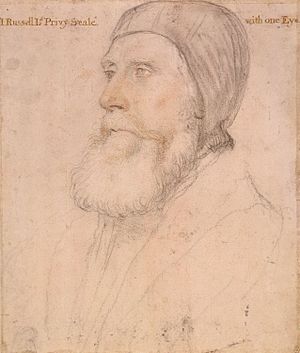
Towards the end of King Henry VIII's reign, Blagge got into trouble because of his beliefs about the Lord's Supper. He was accused of denying the Roman Catholic teaching of transubstantiation, which states that the bread and wine in the Mass truly become the body and blood of Christ.
On 9 May 1546, Blagge was heard saying things that questioned the importance of the Mass. His case was quickly brought to trial along with two others accused of the same heresy.
At his trial in Guildhall, the witnesses against him were Sir Edward Littleton and Sir Hugh Calverley. Both were known to be religiously conservative. According to John Foxe, a famous writer of the time, the words Blagge was accused of saying were: "What if a mouse should eat the bread? Then by my consent they should hang up the mouse." Blagge said he never spoke these words and that it was a misunderstanding. Despite his protests, he was found guilty. He was sentenced to be burned for heresy the following Wednesday and sent to Newgate Prison.
The situation was very serious, especially because Anne Askew, who had similar beliefs, was also being prosecuted by Thomas Wriothesley, the Lord Chancellor, and was later burned at the stake.
However, Blagge had powerful friends. King Henry VIII heard about the trial from people in his household. John Russell, a high-ranking official, then spoke to the King on Blagge's behalf. King Henry immediately issued a pardon, saving Blagge from execution, and ordered Wriothesley to release him.
When Blagge was called to see the King, Henry said, "Ah, my pig!" (which was his nickname for Blagge). Blagge replied, "Yes, if Your Majesty had not been better to me than your bishops were, your pig would have been roasted by now."
Blagge not only escaped death but also seemed to benefit from the King's attention. In November 1546, he was given a profitable job as the comptroller of petty custom in the port of London (a role that involved collecting taxes on goods).
It's not entirely clear if Blagge truly held the strong Protestant views he was accused of. The words he was said to have spoken at his trial seem like a couple of weak jokes. Foxe included Blagge's story to show that life was dangerous for everyone under Wriothesley's harsh religious policies, even if Blagge wasn't a "Protestant hero" in the same way Anne Askew was.
Around this time, Blagge married Dorothy Badby. Their children were very young when he died in 1551. Dorothy later married twice into strong Protestant families, and their son Henry grew up to be a strict Puritan.
Later Career
Religious and Political Changes
Blagge soon became known as someone who supported the Protestant cause because of his appearances in court. The first of these was in the trial of the Earl of Surrey in January 1547. Surrey was accused of using royal symbols, which was seen as a sign that he wanted power. Surrey's father, the Duke of Norfolk, was a strong Catholic supporter and had also been arrested. King Henry VIII became convinced that there was a Catholic plot to put the Howards in power. This helped the Protestant group at court, led by Queen Catherine Parr and the Seymours, who were uncles to the young heir, Edward.
In court, Blagge said that Surrey had often boasted about how powerful the Howards would be after Henry's death, when Edward would need someone to rule for him. Blagge recalled an argument he had with Surrey, saying he would rather stab Surrey than see him or his father rule the young Prince. Blagge was one of more than twenty witnesses who helped convict Surrey, who was executed later that month. Surrey's father, Norfolk, only escaped execution because King Henry VIII died on the very day he was supposed to be executed.
Surrey wrote a poem in his last days, addressing Blagge and changing the word "blame" to "Blage" in later versions, showing their connection.
Supporting the Government
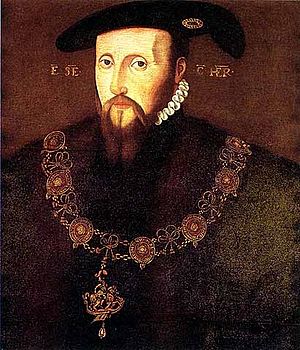
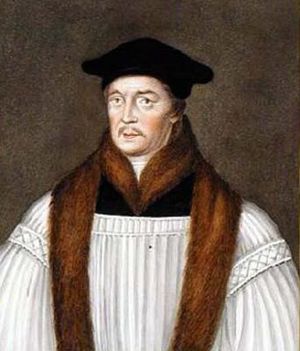
Blagge's trials and testimonies made him well-suited to succeed under the new government that took over after King Henry VIII died on 28 January 1547. In 1547, he was appointed a justice of the peace in his home county of Kent for the first time.
The Parr Family Connection
In the same year, Blagge helped his relatives and showed his support for the new government by acting as a feoffee (someone who holds property for others) in an important property transfer. George Brooke, 9th Baron Cobham, Blagge's cousin, had a daughter named Elizabeth. She was in a relationship with William Parr, 1st Marquess of Northampton, who was Queen Catherine Parr's brother. William Parr was already married, but his wife had left him. In 1547, Parr transferred a large amount of land to Elizabeth. Blagge was listed among the people holding this land, alongside important figures like Edward Seymour, 1st Duke of Somerset, the Lord Protector, and Archbishop Thomas Cranmer. This showed Blagge's loyalty and importance to the new government.
Military Adventures
Blagge was also involved in organizing soldiers for the Scottish campaign that year. This war, known as the Rough Wooing, ended with the Battle of Pinkie Cleugh on 10 September. Blagge likely served throughout the campaign and must have impressed Protector Somerset, who knighted him at Roxburgh between 18 and 25 September 1547, after the victory.
MP for Westminster
Perhaps with Somerset's support, Blagge won one of the Westminster parliamentary seats in November 1547. Westminster had only recently gained the right to have MPs. Many of the early MPs there owned property locally and were connected to the royal court. Blagge fit this description.
This Parliament lasted for most of Edward VI's reign, outliving many of its members, including Blagge. After his death, his seat was taken by Robert Nowell.
The Downfall of Thomas Seymour
In 1548, Blagge was asked to give evidence against Thomas Seymour, 1st Baron Seymour of Sudeley, who was the Lord High Admiral of England and husband of Catherine Parr (Henry VIII's widow). Thomas was accused of trying to pass laws to limit his brother Edward's power as Protector. Blagge testified that Thomas Seymour had told him he planned to introduce laws to make the King "better ordered" and not "kept close." Blagge warned him that this would harm his relationship with his brother.
Although Thomas Seymour's downfall was delayed, his own reckless actions led to his execution the following year. Blagge and John Dudley, 2nd Earl of Warwick, also gave statements in January 1549, saying that Thomas Seymour had threatened to stab anyone who tried to arrest him. At some point, Blagge seems to have shifted his loyalty to Warwick.
Rewards and Duties
In early 1550, after Protector Somerset lost power and Warwick took over, Blagge began to receive clear rewards for his continued loyalty to the Protestant government.
On 8 February 1550, Blagge received many different properties, mostly in Kent, that had belonged to former church owners. This grant was given to him specifically to recognize his service to King Henry VIII in both war and peace. He had to pay a large sum of money for it. The properties included farms, woods, pastures, and marshland. He also received a brewery in London that had belonged to monks.
In April 1550, Blagge leased a new home called Great Stanmore. He got this opportunity because the previous owner, a Spanish soldier, had been killed.
In 1551, Blagge was appointed a commissioner for collecting a tax called relief in Kent and Middlesex. This meant he was responsible for making sure this old tax, which was still important to the English financial system, was collected fully.
Testimony Against Gardiner
Blagge was also asked to give evidence in legal proceedings against Stephen Gardiner, the bishop of Winchester. Gardiner had been King Henry VIII's secretary and a key adviser during the time Protestants were persecuted. Blagge testified that he had been offended by one of the bishop's sermons attacking the Protestant view of the sacrament about three years earlier. This was ironic, considering his own past troubles. However, Blagge was careful in what he said, only recalling what he could clearly remember.
Poet
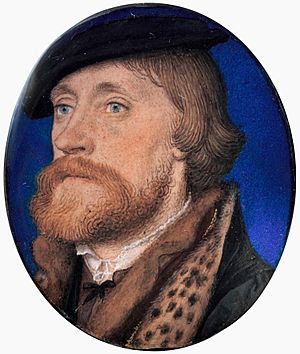
Blagge was part of a group of poets, but his own poetry is not considered very good. He probably wrote many poems, but only about six survive, mostly about political topics. These include poems about Queen Catherine Parr and Jane Seymour. His most famous poem is a harsh epitaph (a short text honoring a deceased person) for Thomas Wriothesley, who had condemned him to death:
Picture of pride; of papistry the plat: In whom Treason, as in a throne did sit; With ireful eye, aye glearing like a cat, Killing by spite whom he thought good to hit. This dog is dead ...
Blagge's most important contribution to English poetry was his habit of collecting his friends' poems. This collection became the famous Blage manuscript, which is now kept at Trinity College, Dublin. It was rediscovered in the 1960s and helped scholars learn more about the poems of Thomas Wyatt and his friends.
Death
George Blagge died on 17 June 1551 at his home in Great Stanmore. The mysterious disease known as sweating sickness was spreading rapidly at the time, and many people at court were dying from it. Blagge was likely one of them. He had not made a will, which suggests his illness came on very suddenly. He left his two-year-old son, Henry, as his heir.
After Blagge's death, Henry Gate took over his job as comptroller of petty custom on 27 June 1551.
Family Life
Marriage
Blagge married Dorothy Badby, who was probably much younger than him and lived for several decades after his death, still alive in 1578. Dorothy was the daughter of William Badby, a landowner from Essex. She had been a maid of honor to Catherine of Aragon before marrying Blagge. George and Dorothy had three children: one son and two daughters.
After Blagge's death, Dorothy married Richard Goodrich, who had been an MP three times. Goodrich was a strong Protestant and an important lawyer who helped create church reforms under King Edward VI. He had worked with Blagge in legal cases against Bishop Gardiner. Dorothy had two more children with Goodrich: Richard and Elizabeth. He died in 1562.
Dorothy then married Sir Ambrose Jermyn, an older, wealthy landowner and courtier from Suffolk, who was also a strong Protestant. He already had a large family from his first wife, but Dorothy had another daughter, Dorothy, with Sir Ambrose. Two of her children by Blagge, and one by Goodrich, married children of Sir Ambrose. This was a common way for families to connect during the Elizabethan era. Sir Ambrose died in 1577, but Dorothy outlived him.
Children
George Blagge and Dorothy Badby had the following children:
- Henry Blagge, born around 1549, who became a Puritan MP for Sudbury in the 1580s. He married his step-sister Hester Jermyn. He inherited land from both the Jermyn and Badby families, as well as his father's lands.
- Judith Blagge, who married Sir Robert Jermyn, the oldest son of Sir Ambrose. He was a very strict Puritan politician.
- Sir Thomas Jermyn, their oldest son, was also active in politics but supported King Charles I during his conflict with Parliament and lost a lot of money lending to him.
- Susan, their youngest daughter, married Sir William Hervey, a more neutral politician. They are ancestors of the Marquesses of Bristol.
- Hester Blagge, who married Charles Le Grice.
 | Shirley Ann Jackson |
 | Garett Morgan |
 | J. Ernest Wilkins Jr. |
 | Elijah McCoy |


